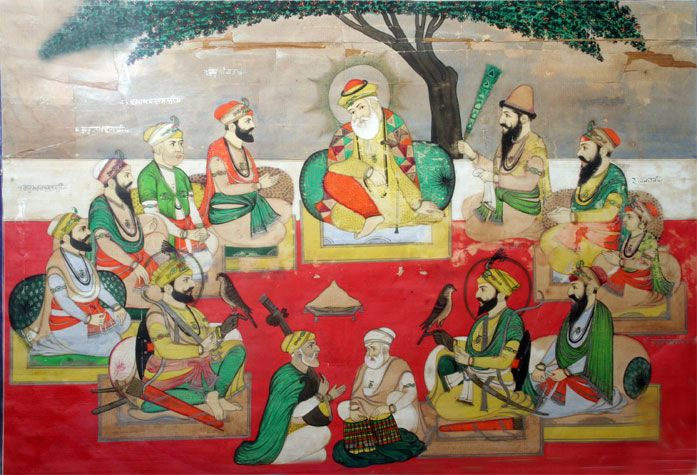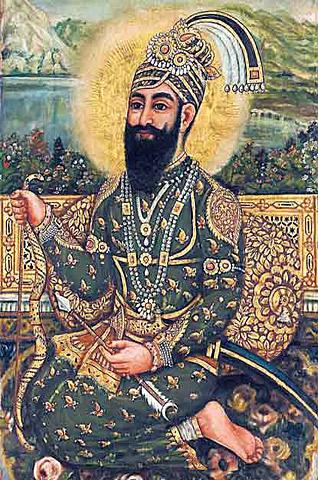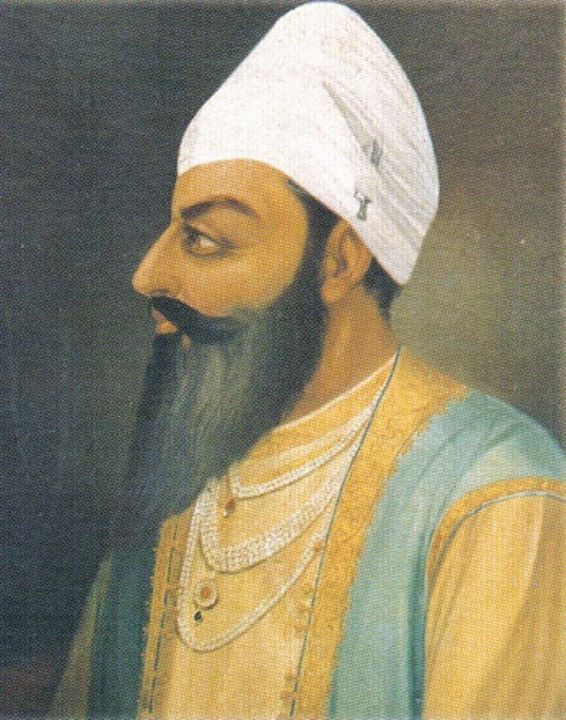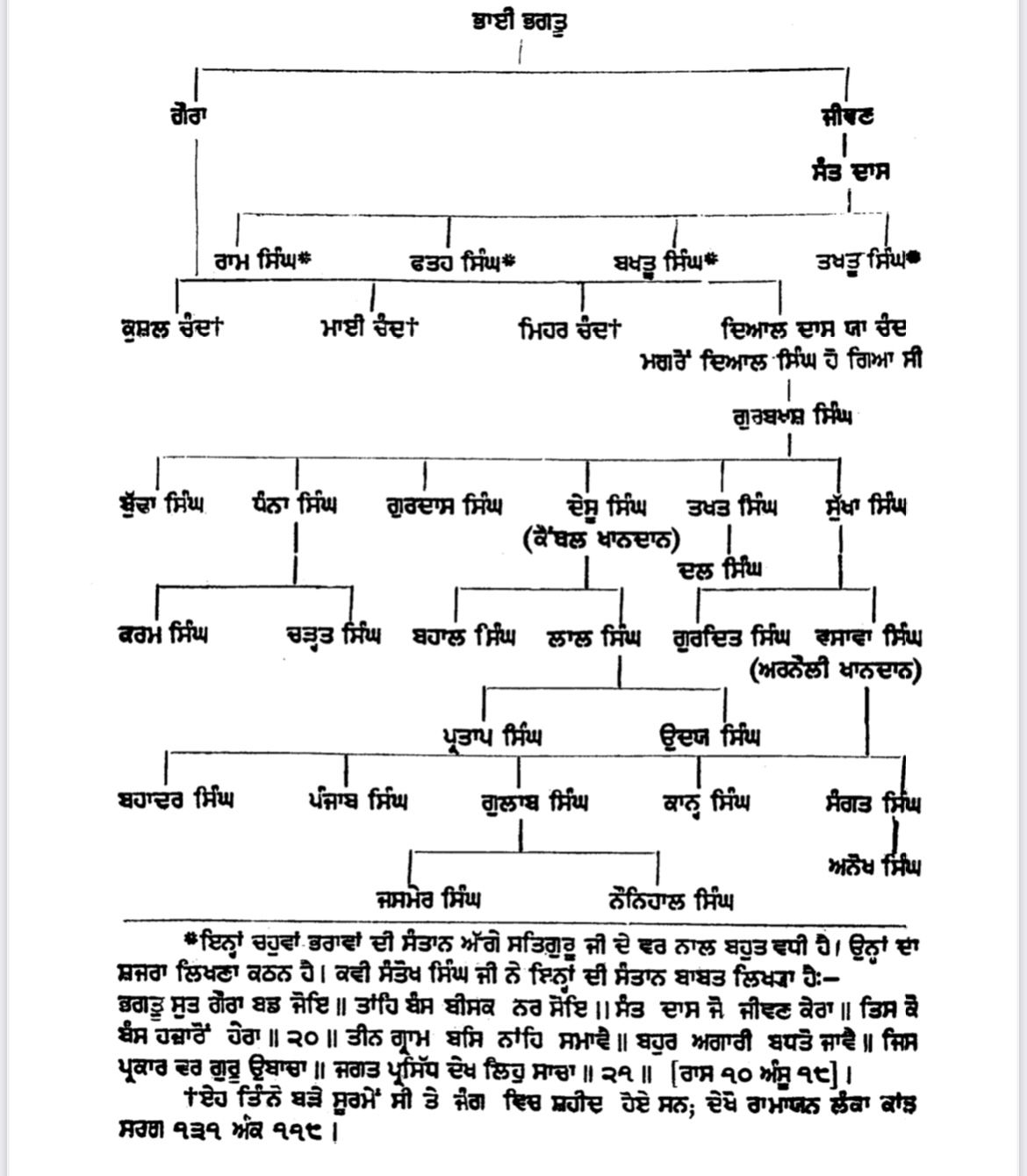Mangal & Kaithhal Lineage

For the previous section, please see here
ੴ ਸਤਿਗੁਰਪ੍ਰਸਾਦਿ
Ik Oankaar Sath[i]GurPrasaadh[i]
ਸ੍ਰੀ ਜਪੁ ਸਾਹਿਬ ਗਰਬ ਗੰਜਨੀ ਟੀਕਾ ਲਿਖਯਤੇ
Sree Jap[u] Jee Saahib Garab Ga[n]janee Teekaa Likhyathae
[Now beginning to] write Garab Ganjanee [Ego-Destroying or Pride-Crushing]
Sri Japji Sahib Commentary:
**Note: The beginning of this granth contains poetry. To be able to better reflect on the interpretations of Kavi Ji's writings, we have included padh-arth [word-by-word definitions]. This section contains chhands #1-12. There are a total of 34 chhands of poetry in the beginning which are followed by the actual commentary in prose.
ਸ੍ਰੀ ਪਰਮਾਤਮਾਯ ਨਮਹ ॥
Sree Parmaathmaay Namah
Word-by-word: Sree = Highest, That which takes on Maya | Paramaathmaay = Param-Aatma, Highest form of Self | Namah = Revering, Bowing |
Revering [or bowing down] to Sri Paramaatmaa [Akaal Purakh]
ਮੰਗਲ ਅਕਾਲ ਪੁਰਖ
Mangal to Akaal Purakh
Majority of the traditional Indian scriptures (previous to British education) began with a Mangal, the purpose of the Mangal is to remember/ask one's Isht-Dev (Divine-Beloved... e.g. for a Sikh: asking Akaal Purakh/Guru Sahib) for support to be able to complete this writing without any obstacles.
ਦੋਹਰਾ ॥ Dhoharaa
Dhoharaa (or Dohara) is a type of chhand [poetic form].
It contains two lines [couplet] which carry the general rules:
28 total maathraa/matra [syllables], 1st line has a pause after 13 matra, 2nd line has a pause after 11 matra. There are many types of Dohara’s, it is also referred to as a Dhohaa/Dohaa.
ਸ਼੍ਰੀ ਅਸਿਧੁਜ ਸੁ ਬਿਲਾਸ ਭੁਜ, ਉਤਭੁਜ ਜੰਗਮ ਜੋਇ॥
Sree Asidhhuj Su Bilaas Bhuj, Outhbhuj Ja[n]gam Joe[i]
Word-by-word:
Sree = Wielder | Asi = Sword | Dhhuj = War Banner, Nishaan
| Su = used as a prefix for positive connotation | Bilaas = playing, enjoying bliss
| Bhuj = Arm, Hand, Branch | Outhbhuj = Trees and Plants [lit. Tearer of Earth] | Jangam = Moving Creature | Joe[i] = Jo Hai = That which is |
Sri Akaal Purakh who is the Powerful Form of Anand/Bliss,
The Arranger of the Moving and Non-Moving Beings
ਸਰਬ ਮਈ ਕਰਤਾ ਪੁਰਖੁ ਨਮੋ ਬੰਦਿ ਕਰ ਦੋਇ ॥੧॥
Sarab Mae-ee Karthaa Purakh[u] Namo Ba[n]dh[i] Kar Dhoe[i]
Word-by-word:
Sarab = All | Mae-ee = nature, essence or = Mae = within | Karthaa Purakh = Doer | Namo = Revere/Bow down to | Ba[n]dh[i] = Closed | Kar = Hands | Dhoe[i] = Both, Two |
I bow down to the Doer responsible for the Entire Universe.

ਦਸਾਂ ਗੁਰੂ ਸਾਹਿਬਾਂ ਦਾ ਮੰਗਲ
Mangal to the 10 Guru Sahibaan:
ਕਬਿਤ ॥ Kabith
Kabith (or Kabitt) comes from Sanskrit word Kavithaa meaning poetry.
Kabith is also a type of chhand [poetic form] in this case.
Kabith's follow these general rules:
16 Akhars/characters in the first line. The first, second, and third pause is after 8 akhars. The fourth pause is after 7 akhars. The last akhar generally ends on a Deeragh/Long Syllable. There are a total of 4 lines in one chhand and a total of 31 akhars. This chhand is also referred to as Ghanaachharee chhand or Manhar chhand.
ਬੇਦ ਬੇਦ ਨਿਰਾਕਾਰ, ਜਾਂਕੋ ਕਹੈਂ ਖੇਦ ਬਿਨੁ,
Baedh Baedh Niraakaar Jaa[n]ko Kahai Khaedh Bin[u]
Word-by-word: Baedh = Vedas, Spiritual Knowledge | Niraakaar = Nir-Akaar = not taking manifestation | Jaa[n]ko = Jis Noo = who has | Kahai = say[s] | Khaedh = pain, suffering | Bin[u] = Without |
Whom The Four Vedas refer to as Niraakaar [not taking on Manifestation]
and without suffering
ਸੋਊ ਹੈ ਅਕਾਰ, ਗੁਰੂ ਨਾਨਕ ਅਨੰਦ ਮੈ ॥
So-oo Hai Akaar Guroo Naanak Ana[n]dh Mai
Word-by-word: So-oo = Vahee, Ohee = [previously mentioned is] also... | Hai = is | Anand-Mai = Anandmae-ee = Essence is Spiritual Bliss
That Same Akaal Purakh took Manifestation as the Form of Bliss known as Dhan Dhan Sri Guru Nanak Dev Sahib Ji
ਅੰਗਦ, ਅਮਰਦਾਸ, ਰਾਮਦਾਸ, ਅਰਜੁਨ,
A[n]gadh, Amardhaas, Raamdhaas, Arjun
Sri Guru Angad Dev Sahib Ji, Sri Guru Amardas Sahib Ji, Sri Guru Ramdas Sahib Ji, Sri Guru Arjan Dev Sahib Ji...
ਸ਼੍ਰੀ ਹਰਿਗੁਵਿੰਦ ਭਏ ਸੋਊ ਸੁਖਕੰਦ ਮੈ ॥
Sree Har[i]govi[n]dh Bh-ae So-oo Sukhka[n]dh Mai
Word-by-word:
Bhae = are/became/were | Sukh = Peace | Ka[n]dh = Root, Cloud | Mai = Nature/Essence
... and Sri Guru Hargobind Sahib Ji Maharaj are the Bestowers of Peace
ਗੁਰੂ ਹਰਿਰਾਇ,ਹਰਿਕ੍ਰਿਸ਼ਨ ਪਰਮ ਜੋਤਿ,
Guroo Har[i]raae[i], Har[i]Krishan Param Joth[i]
Word-by-word: Param = Highest, Ultimate | Joth[i] = Jothee = Light, Radiance |
Sri Guru HarRai Ji Maharaj and Sri Guru HarKrishan Sahib Ji are The [Form of] Ultimate Spiritual Radiance/Spiritual Clarity
ਤੇਗ ਕੇ ਬਹਾਦੁਰ ਬਿਸ਼ਾਰਦੁ, ਮੁਕੰਦ ਮੈਂ ॥
Thaeg Kae Bahaadhur Bishaaradh[u], Muka[n]dh Mai[n]
Word-by-word:
Bishaardh = All-Knower, Really High Position, Famous, Pandit | Muka[n]dh-Mai[n] = Liberation-giving nature
Sri Guru Tegh Bahadur [Brave with the Sword] are the Wisest and Bestower of Liberation
ਸ਼੍ਰੀ ਗੁਬਿੰਦ ਸਿੰਘ ਲੌ ਪਦਾਰਬਿੰਦ ਸਭਨ ਕੇ ॥੩॥
Shree Gobi[n]dh Si[n]gh Lau Padhaarbi[n]dh Sabhan Kae
Word-by-word:
Lau = Till, Until | Padhaar-Bi[n]dh = Lotus Feet | Sabhan Kae = Of All (Guru Sahibaan)
[All of the Guru Sahibaan] Till Sri Guru Gobind Singh Ji Maharaj, All of Their Feet are Lotus-Feet [peace-giving, cool-natured]
ਬੰਦੋਂ ਬ੍ਰਿੰਦ ਦੁੰਦ-ਹਰ ਦੁੰਦ ਹਾਥ ਬੰਦ ਮੈ ॥
Ba[n]dho[n] Bri[n]dh Dhu[n]dh-Har Dhu[n]dh Haathh Ba[n]dhh Mai[n]
Word-by-word: Ba[n]dho[n] = Bowing down, Namaskaar, Pranaam, Revering | Bri[n]dh = All, Total | Dhu[n]dh = Duality, Two | Har = Destroy, Take Away | Haathh = Hand | Ba[n]dhh = Closed | Mai[n] = I |
Reverence to the Remover of All Separation, I fold both hands and bow down to the Ten Gurus.

ਸ਼੍ਰੀ ਕਲਗੀਧਰ ਪਾਤਸ਼ਾਹ ਜੀ ਦੀ ਤਲਵਾਰ ਦੀ ਮਹਿਮਾ ਸ਼੍ਰੀ ਗੁਰੂ ਜੀ ਕੀ ਤਰਵਾਰ ਕੋ ਬਰਨਨ
In Praise of Sri Guru Gobind Singh Ji Maharaj’s Talwar/Sword:
ਕਬਿਤ ॥ Kabith
ਨਿਕਸਤ ਮਯਾਨ ਤੈ ਹੀ, ਛਟਾ ਘਨ ਮਯਾਨ ਤੈ ਹੀ
Niksath Myaan Thai Hee, Chhataa Ghan Myaan Thai Hee
Word-by-word:
Niksath = Coming Out | Myaan = Scabbard, Sheath | Hee = [used in] conviction, being certain... or Ascharaj = Wonderful | Chhataa = Flash, Lightning or if adhak is used then could mean rain as well | Thai = Uss Dhae = This Dhae = referring to same subject as previously mentioned
Coming out of the sheath like lightning from of a storm-cloud
ਕਾਲ ਜੀਹ ਲਹਿ ਲਹਿ ਹੋਇ ਰਹੀ ਹਲਿ ਹਲਿ ।
Kaal Jeeh Lah[i] Lah[i] Hoe[i] Rahee Hal[i] Hal[i]
Word-by-word:
Kaal = Death, Time, Kaal Purakh [Destroyer Being, an aspect of Vaheguru] | Jeeh = Tongue | Lah[i] = Seeing | Hoe[i] = Hoee = is | Rahee = referring to a constant nature or currently | Hal[i] = HilNaa = moving, not staying stable |
The Tongue of Death is shining and shaking!
ਲਾਗੈ ਅਰਿ] ਗਰ, ਗੇਰੇ ਧਰ ਪਰਿ ਧਰ ਸਿਰ
Laagai Ar[i] Gar Gaerae Dhhar Par[i] Dhhar Sir
Word-by-word:
Laagai = Lagee = touching, connecting, uniting | Ar[i] = Enemy | Gar = Throat, Neck | Gaaerae = Falling | Dhhar = Dhharthee = Earth, Ground | Par[i] = Upon | Dhhar = Body | Sir = Head |
When it strikes the enemies’ throat, the head and body fall upon the ground [separately]
ਧਰਤਿ ਨ ਧੀਰ ਚਾਰੋਂ ਚੱਕ ਪਰੈ ਚਲਿ ਚਲਿ ।
Dhharth[i] n Dhheer Chaaro[n] Chak Parai Chal[i] Chal[i]
Word-by-word:
Dhharth[i] = Dhharthee = Earth, Ground | n = negative tense | Dhheer = withhold, bear, tolerate | Chaaro[n] = [Pertaining to all] Four | Chak = directions | Parai = Away | Chal[i] = Chalee = Go |
The earth cannot bear the force of enemies running away in all four directions
ਕੌਨ ਰਹੈ ਠਾਂਢੋ ਸ੍ਰੀ ਗੁਬਿੰਦ ਸਿੰਘ ਆਪਿ ਆਗੈ ?
Kaun Rahai Ttaa[n]tdo Sree Gobi[n]dh Si[n]gh Aap[i] Aagai
Word-by-word:
Kaun = Who | Rahai = Remain | Ttaa[n]do = Cool [referring to nature] or without tippi could = Standing | Aap[i] = You [respectful] | Aagai = In front |
Who can remain standing in front of Sri Guru Gobind Singh Ji?
ਜਲ ਥਲ ਉਥਲ ਪਥਲ ਹੋਇ ਥਲਿ ਥਲਿ।
Jal Thhal Outhhal Pathhal Hoe[i] Thhal[i] Thhal[i]
Word-by-word:
Jal = Water, Ocean, Rivers, etc. | Thhal = Thhalae = Down (ie Ground or Earth) | Outhhal Pathhal = To Make Upside Down | Thhal[i] = Dry Land, Land on a Hill |
The Water & Land have become turned upside down and dried up.
ਭਾਜੈਂ ਬਿਨ ਦੇਰ ਨੇਰਿ ਕਰੈ ਨ ਸੰਤੋਖੁ ਸਿੰਘ
Bhaajai[n] Bin Dhaer Naer[i] Karai n Sa[n]thokh[u] Si[n]gh
Word-by-word:
Bhaajai[n] = Run Away | Bin = Without | Dhaer = Wait, Long Time | Naer[i] = Nearby, Close | Karai = Does
Kavi Santokh Singh: The [Enemies] run away without waiting and do not stay near by
ਹੇਰਿ ਸ਼ਮਸ਼ੇਰ ਸਮ ਸ਼ੇਰ ਤੇਰੀ ਪਲ ਪਲ ॥੪॥
Haer[i] Shumshaer Sum Shaer Thaeree Pal Pal
Word-by-word:
Haer[i] = Seeing, Witnessing | Shumshaer = Sword | Sum = Same | Shaer = Lion, Tiger | Thaeree = Yours | Pal = Moment, Meat, Weight, Amount
Beholding the Shamsher/Sword, it appears to be as [ferocious] as a Lion as it tears flesh like in the same way.

ਕਲਗੀਧਰ ਜੀ ਦਾ ਸਰੂਪ ਦਰਸ਼ਨ
Sri Guru Gobind Singh Ji’s Physical Darshan Description
ਦੋਹਰਾ ॥ Dhoharaa
ਧਨੁਖ ਪਾਨ, ਉਰ ਗ੍ਯਾਨਘਨ, ਕਟ ਸੋਂ ਤੇਗ ਨਿਖੰਗ ।
Dhhanukh Paan, Our Gyaanghan Kat So[n] Thaeg nira[n]gaa[n]
Word-by-word:
Dhhanukh = Bow | Paan = Hand | Ur = Heart | Gyaan = Spiritual Wisdom | Ghan = Cloud | Kat = Waist, Hip | So[n] = From, Of | Thaeg = Sword | Nikhang = Quiver
Wielding the Bow in Their Hand,
Their Heart is a Storm Cloud of Wisdom,
And a Tegh/Sword and Quiver at Their Waist.
ਮੁਕਤਾ ਮਾਲ ਬਿਸਾਲ ਗਰ, ਕਲਗ਼ੀ ਸੀਸ ਉਤੰਗ ॥੫॥
Mukthaa Maal Bisaal Gar Kalgee Sees Outha[n]g
Word-by-word: Mukthaa-Maal = Pearl Necklace | Bisaal = Vishaal = Great | Gar = Neck |
Kalgee = Plume | Sees = Head [respectfully] | Uthang = Really High positioned |
With a Long Great Pearl Necklace around Their Neck and a Tall Kalgi/Plume upon Their Glorious Head
ਜਗਮਗਾਤ ਕਲਗੀਨਿ ਕੇ ਜਰੇ ਜਵਾਹਰੁ ਜੋਇ॥
Jag-magaath Kalgeen[i] Kae Jarae Javaahar[u] Joe[i]
Word-by-word:
Jag-Magaath = Jag Mag = Glowing and Shining | Kae = Of | Jarae = Studded | Javaahar[u] = Jewel[s] | Joe[i] = Joee = Which is or That is
The Studded Jewels are Shining and Glowing upon the Kalgi/Plume
ਜਨੁ ਸਤਿਗੁਰ ਕੇ ਤੇਜ ਨੈ ਤਾਰੇ ਤੋਰਿ ਪਰੋਇ ||੬||
Jan[u] Sathigur Kae Thaej nai Thaarae Thor[i] Paroe[i]
Word-by-word:
Jan[u] = Know, Recognize | Thaej = Radiance, Shine, Sharpness | Nai = Nae = Did | Thaarae = Stars | Thor[i] = Broke, Torn | Paroe[i] = Paroee = Embedded |
Guru Sahib Ji’s Radiance is as if the stars were torn out of the sky and placed upon Maharaj

ਵਿਦ੍ਯਾ ਦਾਤਾ ਜੀ ਨੂੰ ਪ੍ਰਨਾਮ:
Reverence to Kavi Ji’s Vidhya Usthaad [Spiritual Teacher]
ਸ਼੍ਰੀ ਮਤਿ ਮੁਰ ਗੁਰ ਭਜਨ ਮੈਂ ਦਯਾ ਧਾਮ ਅਭਿਰਾਮ ।
Sree Math[i] Mur Gur Bhajan Mai[n] Dhai-aa Dhhaam Abhiraam
Word-by-word:
Sree-Math[i] = Wielder of Wisdom | Mur = Maeraa = My | Gur = [Vidhya] Guru, Ustaad, Spiritual Teacher | Bhajan = Praise | Mai[n] = In | Dhayaa = Compassion/Mercy | Dhhaam = Place | Abhiraam = Beautiful, Bliss-Giving |
In Praise of The One with Wisdom and my Ustaad/Vidhya-Guru;
The Beautiful Home of Compassion/Mercy
ਤਿਨ ਕੇ ਪਗਨ ਪ੍ਰਨਾਮ ਹੈ, ਸੰਤ ਸਿੰਘ ਸ਼ੁਭ ਨਾਮੁ ॥੭॥
Thin Kae Pagan Pranaam Hai, Sa[n]th Si[n]gh Shubh Naam[u]
Word-by-word:
Thin Kae = Their | Pagan = Feet | Pranaam Hai = Bow Down, Revered | Shubh = Good, Positive | Naam[u] = Name
I bow to His Feet whose good name is Sant Singh

ਕੈਂਥਲ ਰਾਜਵੰਸ਼ ਦਾ ਸੰਖੇਪ ਹਾਲ:
A Brief Description of the Kaithhal Royal Lineage
ਕਬਿਤ ॥ Kabith
ਸਿੱਧੂ ਕੁਲ ਤਾਲ ਮੈਂ ਪ੍ਰਫੁੱਲਤ ਕਮਲ ਕਲ
Sidhhoo Kul Thaal Mai[n] Praphulath Kamal Kal
Word-by-word:
Kul = Lineage, Ancestry | Thaal Mai[n] = Within Hand | Praphulath = Blossomed | Kamal = Lotus | Kal = Beautiful |
Keeping the Sidhu Lineage within his hand, The Beautiful Lotus Flower
ਗੋਤ ਭੁਲਹਰੀਏ ਮੈਂ ਦੇਹਿ ਉਤਪਤਿ ਕੀ।
Goth Bhulhareeae Mai[n] Dhaeh[i] Outhpath[i] Kee
Word-by-word:
Goth = Family | Bhullareeae = [potentially] Bhullar | Dhaeh[i] = Dhaehee = Body | Outhpath[i] = Outhpathee = Born, Created | Kee = Of |
Within the Bhullharee [could be Bhullar] family, Bhai Bhagathoo Ji was born...
ਸਤਿਗੁਰੂ ਅਰਜੁਨ ਸਿਰਜਤਿ ਸੁਧਾਸਰ
Sathiguroo Arjun Sirjath[i] Sudhhaasar
Word-by-word:
Sirjath[i] = Created, Developed | Sudhhaa = Amrit | Sar = Sarovar = Pool
When Guru Arjun Dev Sahib Ji created Sudhaasar (Sri Amritsar Sahib)
ਜਾਇ ਸੇਵ ਲਾਗਯੋ ਕਰਿ ਲਾਲਸਾ ਸੁ ਗਤਿ ਕੀ
Jaae[i] Saev Laagayo Kar[i] Laalasaa Su Gath[i] Kee
Word-by-word:
Jaae[i] = Jaaee = Went | Saev = Seva = Spiritual Service | Laagyo = Attached, Touched |
Kar[i] = Karee = Did | Laalsaa = Greed, Desire | Su = Positive Connotation | Gath[i] = Spiritual State | Kee = Of, For
Then Bhai Bhagathoo Ji did seva with the eagerness for liberation.
ਰਾਜ਼ੀ ਹੈ ਰਜ਼ਾਇ ਮੈਂ ਰਿਝਾਇ ਹਰਖਾਇ ਉਰ
Raazee Hai Razaae[i] Mai[n] Rijhaae[i] Harkhaae[i] Our
Word-by-word:
Raazee = Content, Accept, Pleased | Hai = Is/Are | Razaae[i] = Razaaee = [In accordance to Vaheguru’s] Command, Will | Mai[n] = Within | Rijhaae[i] = Rijhaaee = To make pleased | Harkhaae[i] = To Put into Blissful State | Ur = Heart |
Being content with Maharaj’s Hukam, Bhai Bhagathoo Ji made themselves genuinely delighted and peaceful.
ਪਾਯੋ ਮਨ ਭਾਯੋ ਬਰ ਗ੍ਯਾਨਵਾਨ ਮਤਿ ਕੀ।
Paayo Man Bhaayo Bar Gyaanvaan Math[i] Kee
Word-by-word:
Paayo = Place/Put in | Man = Mind | Bhaayo = Enjoyed | Bar = Blessing, Wed | Gyaan-vaan = Holder of Spiritual Wisdom (ie someone who has spiritual wisdom) | Math[i] = Thinking, Way of Perceiving, Mindset, Lens |
Guru Sahib’s Anand/Bliss has has taken over Bhai Bhagathoo Ji’s mind and so they enjoy the Blessing of having Spiritual Wisdom.
ਸਕਲ ਜਗਤ ਮੇਂ ਬਿਦਤ ਦਿਨਪ੍ਰਤਿ ਅਤਿ
Sakal Jagath Mae[n] Bidhath Dhinprath[i] Ath[i]
Word-by-word:
Sakal = Sagal = All, Every | Jagath = World | Mae[n] = Within | Bidhath = Known, Famous | Dhin-Prath[i] = Daily (lit. Day-Repeat) | Ath[i] = Now, Currently, Limit, End
Throughout the whole world, Bhai Bhagathoo Ji will always be one of the most known
ਕੀਰਤਿ ਭਗਤਿ ਭਾਈ ਭਗਤੂ ਭਗਤ ਕੀ ॥੮॥
Keerath[i] Bhagath[i] Bhaaee Bhagathoo Bhagath Kee
Word-by-word:
Keerath[i] = Keerthee = Praises, Songs | Bhagath[i] = Bhagthee = Worship/Remembrance/Divine Love | Bhaaee[Bhai] = Brother | Bhagath = Devotee, Rememberer, Worshipper, Divine Lover |
This is the Praise and Bhagathee of Bhagat Bhai Bhagathoo Ji.
ਕਬਿਤ ॥ Kabith
ਤਿਨ ਕੋ ਤਨੁਜ ਗੌਰਾ ਬੀਰਨਿ ਮੇ ਬੀਰ ਗੌਰਾ
Thin Ko Thanuj Gauraa Beeran[i] Mae Beer Gauraa
Word-by-word:
Thin Ko = Their | Thanuj = Son | Beeran[i] = Brave ones [ie warriors] | Mae = Among [in this context] | Beer = Warrior |
[Bhai Bhagathoo Ji’s Son] Bhai Gauraa Ji was the Bravest among Brave
ਤੇਜ ਤੁਰਕਾਨਿ ਤoਰਾ ਦਲ ਮੋਰਾ ਮਾਰਿਕੈ ।
Thaej Thurkaan[i] Thoraa Dhal Moraa Maarikai
Word-by-word:
Thaej = Power | Thurkaan[i] = Turk Government | Thoraa = Broke | Dhal = Army | Mora = Turned Away | Maari-kai = After Killing, Destroying
The Efforts of the Turk Government was weakened by killing their army
ਜੰਗ ਮੈ ਨਿਸੰਗ ਬੀਰ ਰੰਗ ਮੇ ਸੁਰੰਗ ਭਯੋ
Ju[n]g Mai nisa[n]g Beer Ra[n]g Mae Sura[n]g Bhayo
Not shy in battle, Bhai Gauraa Ji looked quite beautiful in warrior spirit/rage (Bir Ras)
ਬਹੁ ਕਰਿ ਵਾਰ ਕਰਵਾਰੁ ਕੋ ਪ੍ਰਹਾਰਿਕੈ ॥
Bah[u] Kar[i] Vaar Karvaar[u] Ko Prahaar[i]kai
Word-by-word:
Bah[u] = Multiple, Many | Kar[i] = Karee = Did | Vaar = Strike | Karvaar[u] = Thalwaar = Sword | Prahaari-kai = After Striking, AttackingStriking many times, and attacking with the Talwaar/Sword
ਪੌਰਖ ਸੰਭਾਰਿਕੈ ਸੰਘਾਰਿਕੈ ਸਮੂਹ ਸ਼ਤ੍ਰ
Paurakh Sa[n]bhaarikai Sa[n]ghaarikai Samooh Shathr
Word-by-word:
Paurakh = Bravery, Effort, Macho-ness | Sa[m]bhaari-kai = After Controlling, Maintaining, Supporting | Sa[n]ghaari-kai = After Destroying | Samooh = All | Shathr = Enemies |
Dominating (in the battle field), destroying all of the enemies
ਹੋਯੋ ਰਖਵਾਰ ਸੰਗਿ ਗੁਰ ਪਰਵਾਰ ਹੈ।
Hoyo Rakhvaar Sa[n]g[i] Gur Parvaar Hai
Word-by-word:
Hoyo = Becoming | Rakhvaar = Protector, Defender | Sa[n]g[i] = Sangee = Supporter, Friend | Gur = Guru | Parvaar = Family | Hai = Is
They acted as a Defender of Guru Sahib’s Family
ਤਾਂਕੋ ਸੁਤ ਦਯਾਲਦਾਸ ਜਗ ਮੈ ਪ੍ਰਕਾਸ਼ ਕੀਨ
Thaa[n]ko Suth Dhyaaldhaas Jag Mai Prakaash Keen
Word-by-word:
Thaa[n]ko = referring to previously described subject | Suth = Son | Jag Mai = Within the World | Prakaash = Radiance, Brightness, Glory | Keen = Did |
[Bhai Gauraa Ji’s] son Dhayaal-Dhaas/Dayal-Daas was well known in the world
ਪ੍ਰੇਮ ਰਸ ਭੀਨ ਸਦਾ ਅਗਮ ਅਪਾਰੁ ਕੈ ॥੯॥
Praem Ras Bheen Sadhaa Agam Apaar[u] Kai
Word-by-word:
Praem = Love | Ras = Flavour/Genre/Mood/Taste/Juice | Bheen = Drenched | Sadhaa = Always, Constantly | Agam = which cannot be gone to, Unmoving, Stable | Apaar = Endless [ie who does not have a crossable point] | Kai = Of, Belonging To |
Being always drenched in the Divine Love of the Forever Stable & Unreachable [One~Vaheguru]
ਦੋਹਰਾ ॥ [Dhoharaa]
ਤਿਨ ਕੋ ਸੁਤ ਗੁਰਬਖਸ਼ ਸਿੰਘ ਤਤਵੇਤਾ ਮਤਿ ਧੀਰ।
Thin Ko Suth Gurbakhsh Si[n]gh Thathvaethaa Math[i] Dhheer
Word-by-word:
Thath-vaethaa = Knower of the Essence [of Reality] | Math[i] = Mindset, Lens, Thinking | Dhheer = Tolerant, Stable, Patient |
[Bhai Dhayaal Dhaas’] Son was Gurbaksh Singh, who was Spiritually Wise and had an egoless way of thinking
ਤਿਨ ਤੇ ਦੇਸੂ ਸਿੰਘ ਭੇ ਦੇਸ਼ ਪਤੀ ਬਰ ਬੀਰ ॥੧੦॥
Thin Thae Dhaesoo Si[n]gh Bhae Dhaesh Pathee Bar Beer
Word-by-word:
Thin Thae = From Them | Bhae = Came to Be | Dhaesh-Pathee = King [lit. Honour/Protector of Land/Country] | Bar-Beer = Bal-Beer = Brave Warrior [Bal lit. = Power/Strength]
From [Bhai Gurbaksh Singh] Bhai Dhaesu/Desu Singh came,
the Brave Warrior and Honour of the Land
ਸਾਠ ਸਊਰਨਿ ਸੰਗ ਲੈ ਕਪਿਥਲ ਲੀਨ ਛੁਰਾਇ।
Saatt Sooran[i] Su[n]g Lai Kapithhal Leen Chhuraae[i]
Word-by-word:
Saatt = Sixty, 60 | Sooran[i] = Warriors | Sung-Lai = Took With | Kapithhal = Kaithhal Kingdom | Leen = Took | Chhuraae[i] = Chhuraaee = Stole |
Taking 60 Horsemen with him, Bhai Desu Singh took the Kingdom of Kaithhal
ਤਹਾਂ ਪਠਾਨ ਜਿ ਪੰਚ ਸੈ ਹਤਿ ਕਰਿ ਦਏ ਭਜਾਇ॥੧੧॥
Thahaa[n] Pattaan Ji Pa[n]ch Sai Hath[i] Kar[i] Dha-ae Bhajaae[i]
Word-by-word:
Thahaa[n] = There [as in place] | Pattaan = Ethnically Pathan | Pa[n]ch-Sai = Five Hundred, 500 | Hath[i] = Kill | Kar[i] = Karee = Did | Dhae = Gave | Bhajaae[i] = Bhajaaee = Made to Run Away, Flee |
Bhai Desu Singh killed 500 Pathans and made them run away
ਲਾਲ ਸਿੰਘ ਤਿਨ ਕੇ ਤਨੁਜ ਮਤਿ ਅਪਾਰ ਗੁਨਵੰਤ।
Laal Si[n]gh Thin Kae Than[u]j Math[i] Apaar Gunva[n]th
Word-by-word:
Math[i] = Mathee = Way of Thinking, Intelligence | Apaar = Without Paar = Crossable Point [ie Endless] | Gun = Good Quality, Trait | Va[n]th = Holder, Wielder |
Bhai Laal Singh was [Bhai Desu Singh’s] son. Bhai Laal Singh was quite wise and had many great qualities.
ਸਭ ਦੇਸ਼ਨਿ ਮੈਂ ਬਿਦਤ ਬਹੁ ਕੁਲਦੀਪਕ ਜਸਵੰਤ ॥੧੨॥
Sabh Dhaeshan[i] Mai[n] Bidhath Bah[u] Kuldheepak Jasva[n]th
Word-by-word:
Sabh = All | Dhaeshan[i] = Daesan[i] = Within Lands, Countries | Mai[n] = Among | Bidhath = Bad Qualities | Bah[u] = A lot, Many | Kul = Ancestry, Lineage | Dheepak = Dheevaa, Candle, Lamp [ie shining brightly] | Jas = Praises | Va[n]th = Holder, Wielder |
All other lands were cursed, whereas the heavily praised Bhai Laal Singh was the shining-lamp of the Sidhhoo lineage/ancestry.
ਕਬਿਤ ॥ [Kabith]
ਤਾਂਕੋ ਸੁਤ ਉਦੇ ਸਿੰਘ ਜੈਸੇ ਉਦੇ ਸਿੰਘ ਭਯੋ
Thaa[n]ko Suth Oudhae Si[n]gh Jaisae Oudhae Si[n]gh Bhayo
Word-by-word:
Jaisae = As In, Just Like | Bhayo = Came to Be |
Bhai Laal Singh Ji’s son is Raja Udhai Singh, this is how Udhai Singh came to be.
ਰਿਦੇ ਕੋ ਮ੍ਰਿਦੁਲ ਧੀਰ ਧਾਰਿਬੇ ਕੋ ਧਰ ਸੋ ।
Ridhae Ko Mridhul Dhheer Dhaaribae Ko Dhhar So
Word-by-word:
Ridhae = Heart | Mridhul = Tender, Sweet | Dhheer = Patience, Forbearance, Tolerance | Dhharibae = Took on | Dhhar = Dhharthee = Earth, Ground | So = Like |
Raja Udhai Singh is warm-hearted and has the quality of Dhheeraj (Patience/Forbearance/Tolerance) like the earth (ability to bear the weight of so much)
ਗੁਨ ਗ੍ਰਾਹ, ਗੁਨ ਗਾਹ, ਗੁਨ ਗ੍ਰਿਹ, ਗੁਨ ਗੌਰ,
Gun Graah Gun Gaah Gun Grih Gun Gaur
Word-by-word:
Gun = Virtues, Good Qualities, Positive Attributes | Graah = Engrain, Hone | Gaah = Understand, Know, Recognize | Grih = House, Home | Gaur = Reflect, Thought, Focus, Paying Attention
Engrainer of Virtues, Knower of Good Qualities, Home of Pleasant Attributes, pays attention to Positive Attributes
ਗੁਰੂ ਗਿਰਾ ਗੇਯ ਗਤਿ ਗਮਯ ਗਾਰ ਗਿਰ ਸੇ।
Guroo Giraa Gaey Gath[i] Gamy Gaar Gir Sae
Word-by-word:
Giraa = Words, Tongue | Gaey = Worth Understanding, Singer, Worth Singing For | Gath[i] = Gathee = Spiritual State | Gamy = Worth Knowing, Worth Attaining, Worth Accomplishing | Gaar = Pride, Ego | Gir = Mountain, Words, Falling, House | Sae = From, That |
[Raja Udhai Singh] knows the Importance of Gurbani and Spirituality as they are able to topple the ego...
ਦਸੋ ਦਿਸ਼ ਦੌਰੈ ਜਸੁ ਦਾਨ ਦੇਬੋ ਦਿਨ ਦਿਨ
Dhaso Dhish Dhaurae Jas[u] Dhaan Dhaebo Dhin Dhin
Word-by-word:
Dhas-o = All Ten, 10 | Dhish = Dhis = Directions [N, E, S, W, NE, NW, SE, SW, Up, Down] |
Dhaurai = Run, Flow | Jas[u] = Praises | Dhaan = Donation[s] | Dhaebo = Give | Dhin-Dhin = Day-by-Day |
In all 10 directions, Raja Udhai Singh’s Praises flow as they give a lot of daily donations
ਦਾਰਿਦ ਦੁਰਦ ਦਰਿਬੇ ਕੋ ਸ਼ੇਰ ਦਰਸੇ।
Dhaaridh Dhuradh Dharibae Ko Shaer Dharasae
Word-by-word:
Dhaaridh = Poverty | Dhuradh = Elephant [Two Tusks] | Dharibae = Wealth | Ko = Of | Shaer = Lion | Dharsae = After Seeing |
The elephant of poverty runs upon seeing the lion (referring to Raja Udhai Singh’s donations)
ਬਾਲ ਬੈਸ ਬਪੁ ਮੇ ਬਿਲੋਕਿ ਲੋਕ ਬਿਸਮਤਿ
Baal Bais Bap[u] Mae Bilok[i] Lok Bismath[i]
Word-by-word:
Baal = Wind, Sacrifice, Child[hood], Naive | Bais = Vaishy = Those who Farm or Trade | Bap[u] = Body, Form | Bilok[i] = Seeing | Lok = People | Bismath[i] = Shocked, Astounded, In Wonder, In Awe |
Those Innocent People of the Working Class see this and are astounded
ਬ੍ਰਿਧਨਿ ਸੀ ਬੁੱਧਿ ਮੁਖ ਬਾਰਿਜ ਸਦਰਸੇ ॥੧੩॥
Word-by-word:
Bridhhan[i] = Growing, Senior [Wise] | Buddh[i] = Budhhee = Intellect | Mukh = Face | Baarij = Lotus [Born from the Water] | Sadharsae = Sadhris = Like, Similar to |
Bridhhan[i] See Budhh[i] Mukh Baarij SadharasaeRaja Udhai Singh only grows wiser & wiser.
Raja Ji has a face like that of a lotus flower.
–
Please point out any mistakes, omissions, corrections etc.
Forgive for any mistakes.
Guru Panth Ka Daas,
Aaeenaa


